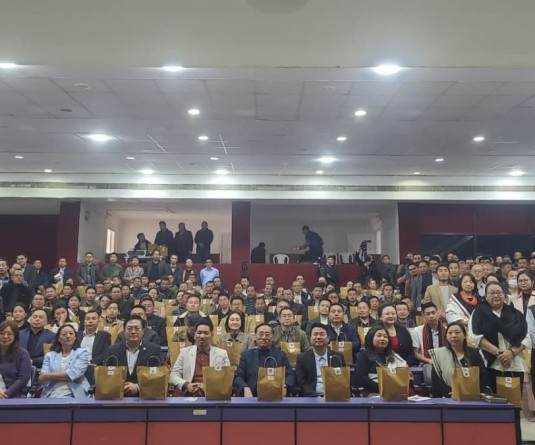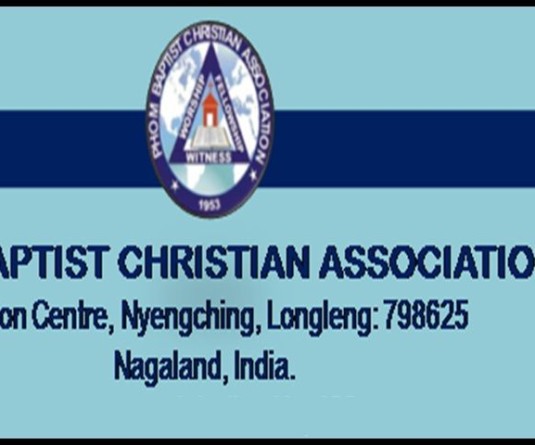NSCW Chairperson W Nginyeih Konyak, DC Dimapur Dr Tinojongshi Chang, Advocate Vrinda Grover and others during launch of UniTE poster campaign to End Digital Violence against All Women and Girls’ on November 25. (Morung Photo)
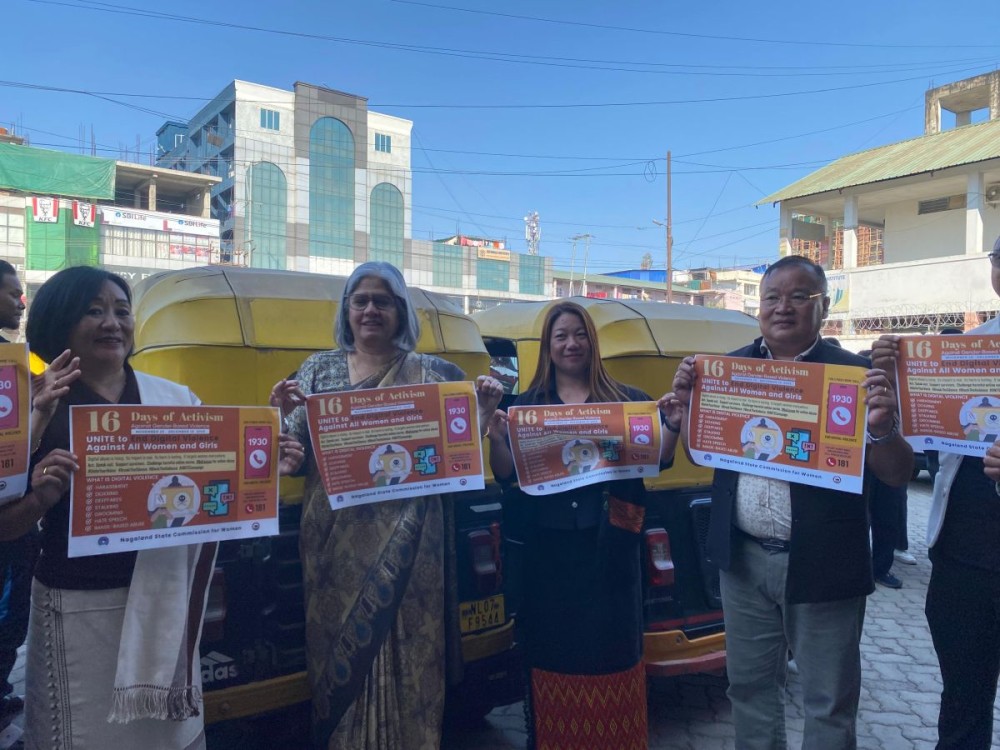
Morung Express News
Dimapur | November 25
“Inequality and discrimination are the root causes of violence,” Advocate Vrinda Grover stated, further asserting that violence is rarely the outcome of individual temperament alone but is instead the result of structural power imbalances.
It is “almost always inflicted by the powerful on a person or a creature who has less power than the one inflicting the violence,” she said.
What society observes is only the surface such as “a husband who gets angry,” while the deeper inequalities driving such violence remain ignored, the Supreme Court Advocate held addressing the International Day for the Elimination of Violence Against Women event held at Town Hall, Dimapur, under the theme ‘UniTE to End Digital Violence against All Women and Girls.’
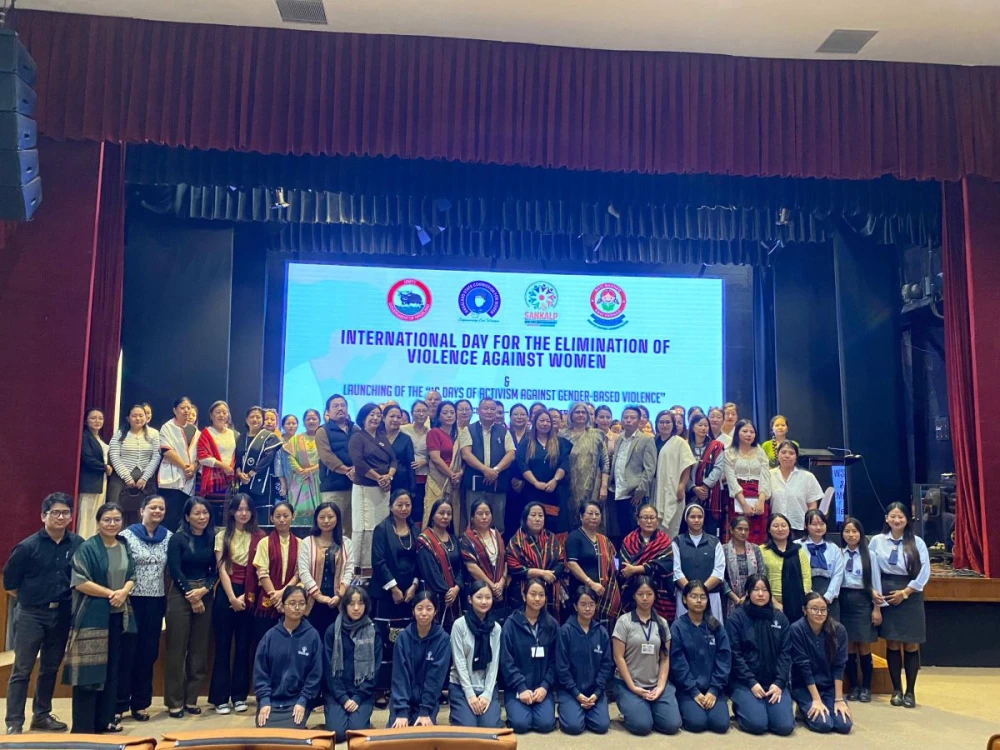
Organised by the Nagaland State Commission for Women (NSCW) in collaboration with Dimapur District Administration, District Hub for Empowerment of Women (DHEW), and Mission Shakti, Dimapur, it also launched the ‘16 Days of Activism against Gender-Based Violence’ beginning November 25-December 10.
Grover highlighted the strong link between social injustice and gender injustice, noting that gender-based discrimination “crosses all barriers of class, caste, ethnicity, religion and is unfortunately pervasive in society.”
Referring to the aftermath of the 2012 Nirbhaya case, she pointed out that the 2013 amendments recognised for the first time that crimes could occur “both on the internet as well as in person.”
She spoke at length about the dual nature of technological progress. Technology has expanded access, connectivity and efficiency.
“As a lawyer I can tell you … yesterday I was in Kohima and I attended a matter in the Uttarakhand High Court online.” She added that Courts’ adoption of digital systems now enables people to work and participate from anywhere.
However, without societal change, she cautioned that these advancements become a double-edged sword. “The same technology becomes a medium of violence.” The long-standing fear associated with women stepping out at night has now “migrated to cyberspace,” she stated.
The Supreme Court lawyer noted that technology often amplifies existing inequalities.
“Technology enables speed. It enables amplification. And you can sit anywhere and trouble someone.” Unlike physical harassment which requires proximity, online abuse can occur from any location. “I can be sitting in a remote village and actually cyberbully or harass somebody sitting anywhere else.”
Grover said this phenomenon aligns with what the United Nations terms technology-facilitated violence against women and girls, which acknowledges how “technology can aggravate” pre-existing forms of discrimination and harm.
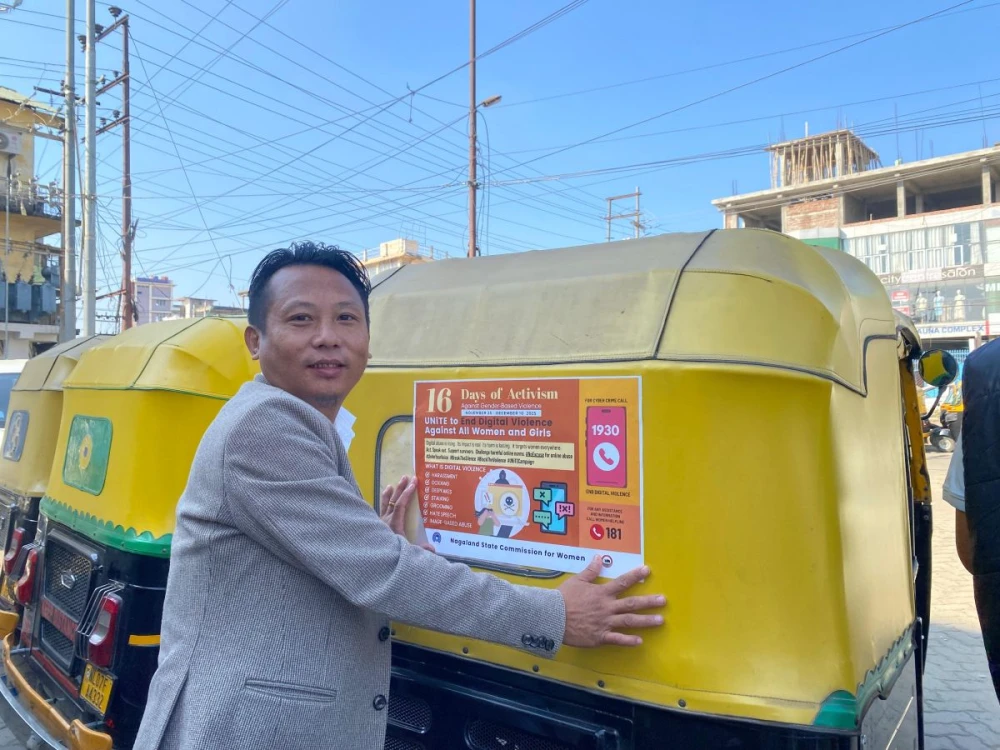
Digital safety central to gender equality: NSCW Chairperson
Violence against women and girls continues to affect one in three women worldwide, said Nagaland State Commission for Women (NSCW) Chairperson W Nginyeih Konyak at the inaugural address.
She described violence against women as a global human rights emergency that must stop, noting that this year’s campaign focuses on digital violence against women and girls, which has become one of the fastest-growing forms of abuse.
The campaign, she said, reminds that “digital safety is central to gender equality.”
Konyak said that although digital spaces should empower women and girls, yet every day, for millions of them, it has become “a minefield of harassment, abuse, and control.” Digital abuse includes image-based abuse, non-consensual sharing of intimate photos, cyberbullying, trolling, online threats, and AI-generated deepfakes designed to humiliate or spread hate speech.
“These acts don’t just happen online, they often escalate into offline violence such as coercion, physical abuse, and even femicide,” she cautioned, adding that the harm is long-lasting.
Digital violence disproportionately targets women and girls, with even harsher consequences for those facing multiple forms of discrimination, including racism, disability, gender identity or sexual orientation.
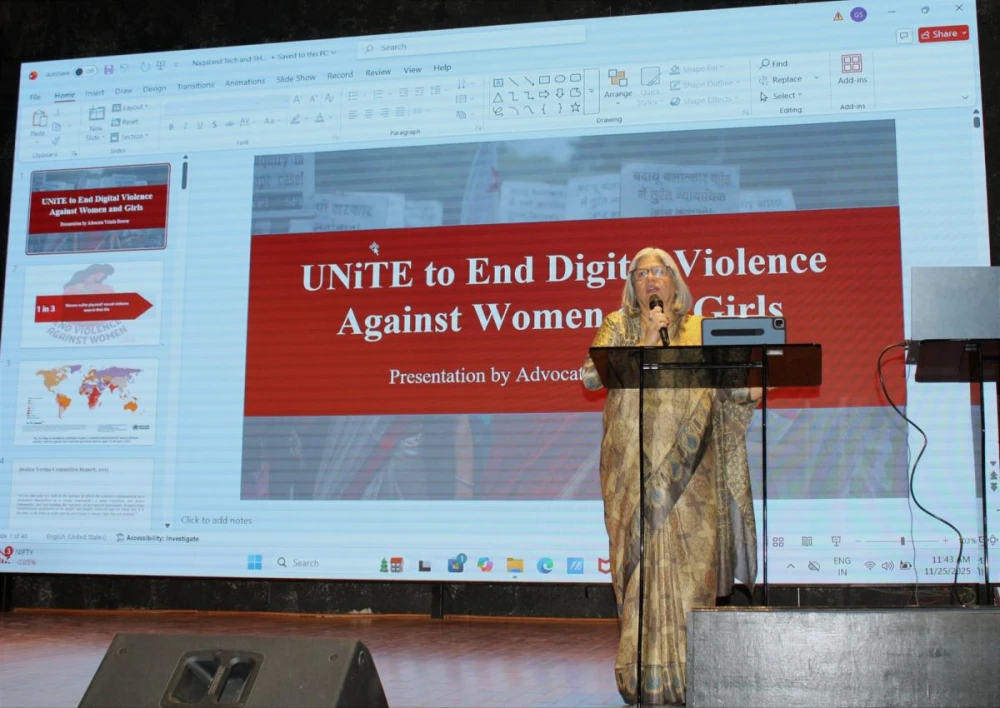
Highlighting the 2025 theme, Konyak said the campaign calls on governments, civil societies, private sectors and individuals to confront online harassment and all digital forms of abuse.
Appealing on behalf of NSCW and its collaborating agencies, she urged all UNiTE partners to actively participate in the November 25–December 10 campaign period by supporting survivors, engaging in local advocacy, and raising awareness on ending violence against women and girls. Konyak reiterated this year’s campaign slogan, “No Space for Online Abuse.”
Breaking the silence
“Today we remember the countless women who have suffered in silence, those who are survivors and those who tragically lost their lives,” said Dr Tinojongshi Chang, Dimapur Deputy Commissioner, in his brief address during the event.
Acknowledging their courage, Dr Chang stated that breaking the silence is the first step towards change. He encouraged the gathering to look at the world with renewed determination, noting that laws have improved, awareness has grown, and many communities are standing up.
“But the work is far from over. Statistics continue to show that one in three women worldwide experiences physical or sexual violence in her lifetime. Behind every number is a mother, a sister, a daughter, a friend, someone with a dream, hope and a right to safety.”
Ending violence against women is not the responsibility of women alone, but everyone's responsibility. He called on all men, women, youth, institutions, governments and communities to bring a change within their own capacity.
Urging citizens to encourage survivors to speak up and build a system that listens, Dr Chang held that “when a survivor gathers the courage to speak, the least we can do is believe her and stand beside her.”
He underscored the powerful role of education and said that empowerment has an even stronger impact when “women are educated, economically independent and confident.”
The DC asked the attendees to take action by reporting violence when you see it, support a survivor, speak against harmful behaviors, teach respect, and promote equality. “Small actions, when multiplied across a community become powerful movements,” he said, while adding, “A society can only progress when its women are safe, valued, and empowered.”
Reiterating that violence against women is a human issue, a moral and a societal issue, he conveyed hope that “together we have the power to win it.”
The UniTE poster campaign was also launched during the event, with the President of Dimapur District Auto Drivers' Union (DDADU) Tito Yeptho, along with DC Dr Tinojongshi Chang, Adv Vrinda Grover and NSCW Chairperson W Nginyeih Konyak.


